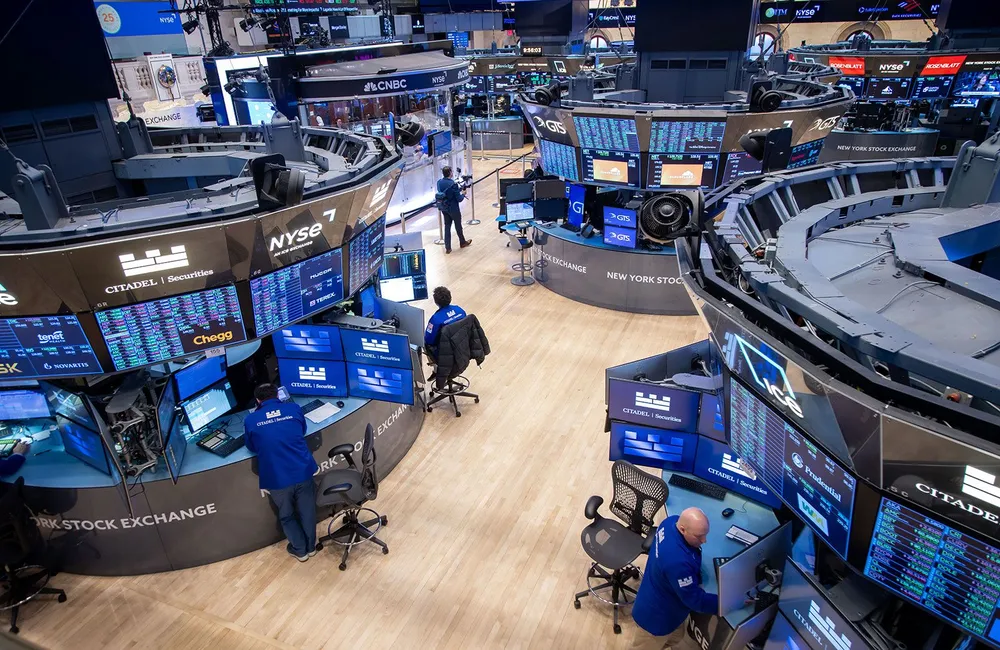Stocks across the board fell in the United States on Wednesday, for a fourth straight day of declines on the expectation that the Federal Reserve is moving closer to a tighter policy. That brought them down roughly 4 percent for the month.
By 4 p.m. Eastern time, the S&P 500 was 0.8 percent lower. The Dow Jones Industrial Average lost roughly 280 points, or 0.9 percent, and the Nasdaq Composite declined 0.6 percent. Ten of the S&P 500’s 11 sectors were down, and communication services was the only sector rising on the day.
Stocks have staggered since Fed Chairman Jerome Powell’s Jackson Hole, Wyo., speech, in which he said interest rates must be raised even higher until inflation is licked, despite elevating recession risk.
Federal Reserve speakers “are making clear that the central bank is not turning off the path to tightening anytime soon,” said Quincy Krosby, chief global market strategist at LPL Financial. “The question now is how much pain the Fed will visit, and how long it will take for inflation to fall. It’s the market trying to find an equilibrium with where stocks should be priced based on those expectations.”
In the wells of commodities, Brent crude fell by 2.84% to $US96.49 a barrel. Gold slipped 0.8 percent to US$1,710.55.
Australian 2yr government bond yields continued to ease, falling to 2.95% while 10yr yields eased to 3.59%. Internationally, the 2 Year US Treasury note was yielding 3.49% and the 10 Year US Treasury note was yielding 3.19%.
The Aussie dollar rose to 68.63 US cents from 68.53. The Wall Street Journal Dollar Index, which measures the U.S. currency against 16 others, slipped to 100.23.
Asia
Chinese shares ended down, with automakers, renewable-energy companies and miners all declining. Investors seem indecisive toward markets’ trend, and the Fed’s tightening and the strong dollar will have an impact on global capital markets,” China Fortune Securities writes in a note. BYD Co. fell 7.4% after Warren Buffett’s Berkshire Hathaway reduced its stake. CATL, an electric-car battery maker, fell for a sixth day, losing 1.7%, while Ganfeng Lithium dropped 5.4%. In the gainers, China Vanke climbed 4.7% after reporting an 11% surge in 1H net profit. The Shanghai Composite Index dropped 0.8% to 3202.14, 1.6% lower for August. The Shenzhen Composite Index fell 1.9 percent, and the ChiNext Price Index was down 1.6 percent.
Hong Kong's Hang Seng Index finished flat at 19954.39, with gains in the tech and consumer-related sectors countered by losses in auto makers. U.S. stock futures rose after three consecutive days of decline on Wall Street, as investors weighed the latest crop of company earnings. BYD Co. fell 7.9% after Warren Buffett’s Berkshire Hathaway reduced its stake in the automaker. Haidilao was the top gainer, rising 6.5% following its 1H results with analysts saying its financial position improved. Shares in Baidu were down 3.3% after 2Q revenue dropped on year. But Meituan and Tencent Holdings rose 2.6% and 1.1%, respectively. The property company CIFI Holdings dropped 15 percent after its private placement announcement.
The Nikkei Stock Average eked out a 0.4% loss to end at 28091.53, after having been sharply down in the session. Markets will monitor government monetary policy developments after the Bank of Japan policy board member Junko Nakagawa said on Wednesday that the bank will continue monetary easing until sustainable wage growth and price gains are in sight. Shares of financial companies were lower, as the market worried as to whether the Fed may have to be more aggressive in tightening policy following strong U.S. labor-market data. Mitsubishi UFJ Financial Group dropped 1.0% and Aozora Bank was down 0.5%, as was Sumitomo Mitsui Financial Group.
Europe
European indexes slid on the day. The pan-European Stoxx 600 fell 1.01%, the German DAX index was down 1% and the French CAC fell 1.37%.
Inflation in the eurozone reached 9.1 percent in August, a record, a data release showed. On Wednesday, a major natural gas pipeline connecting Western Europe and Russia was shuttered for maintenance, raising concerns supplies may not be turned back on.
In London, the FTSE 100 dropped once more on Wednesday, pressured by declining energy prices weighing on oil majors BP and Shell. London’s blue-chip index closed 1.1% lower, as Shell’s fell 2.1% and BP’s dropped 1.7%. Energy infrastructure providers National Grid and SSE were the day’s biggest fallers, closing 4.1% and 3.4% lower.
“Up until the end of last week the FTSE 100 looked set for a positive month, but the last 3 days and a very hawkish tone from Powell’s Jackson Hole speech has seen the rug pulled out from underneath that positive sentiment,” said Michael Hewson from CMC Markets UK.
North America
Stocks across the US fell on Wednesday, in what was a fourth consecutive day of declines as an anticipated tightening of Federal Reserve policy ate into investor sentiment. They were off around 4 percent for the month.
The S&P 500 was 0.8 percent lower at 4 p.m. ET. The Dow Jones Industrial Average dropped roughly 280 points, or 0.9 percent, while the Nasdaq Composite shed 0.6 percent. Ten of the S&P 500’s 11 sectors fell, with communication services the only gainer on the day.
Stocks have been under pressure since the Federal Reserve chairman, Jerome Powell, said at Jackson Hole, Wyo., that interest rates should be further raised until inflation is subdued, despite increased risk of a recession.
“Federal Reserve speakers are emphasizing that the Fed won’t suddenly pivot away from tightening,” said Quincy Krosby, the chief global strategist at LPL Financial. “The only question now is how much pain the Fed will cause, and how long the Fed will take to get inflation down. The market is searching for an equilibrium with where stocks should be valued given those expectations.”
Preventing high inflation will probably necessitate raising the central bank’s benchmark short-term interest rate, which now stands in the range between 0 and 0.25 percent, above 3.5% and keeping it there through next year, according to John Williams, president of the New York Fed.
Now, investors are shifting their focus to the health of the labor market and what it portends for the trajectory of Fed policy, with Friday’s jobs report in the spotlight.
“The August report is key; if pressures on wages are falling and job openings decrease, that could be a positive for stocks,” Ms. Krosby said.
ADP’s monthly jobs report for August, published on Wednesday, indicated that private-sector employers added fewer-than-expected 132,000 jobs, suggesting that the labor market has cooled along with the economy and recession fears. Economists surveyed by The Wall Street Journal had forecast a gain of 300,000 jobs.
In afternoon trading, shares of the pet retailer Chewy were 7.9 percent lower after it reduced its sales guidance for the year, blaming shifting consumer habits. Shares of Bed Bath & Beyond fell 21 percent. The retailer and meme stock said it would shut about 150 of its flagship stores, reduce its workforce and introduce new financing.





















